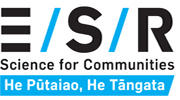EOCs are used daily by individuals and industries globally with substantial amounts released into the environment. Regulators worldwide are concerned about the impacts of EOCs in the environment and in our food. The widespread distribution of EOCs is detrimental to the health and resilience of freshwater and marine ecosystems. They also promote antimicrobial resistance in microorganisms, which WHO identifies as the biggest threat to human health. Land-based food production and processing, fishing and aquaculture industries are also vulnerable to EOC contamination that could result in trade barriers.
Here in New Zealand, regulators, industry, Māori and communities are concerned about EOC risks and the knowledge gaps to assess their impacts on our physical, environmental, and economic wellbeing.
ESR is part of the multi-disciplinary research team, which includes eight other collaborators including international collaborators, iwi and stakeholders. The team will look at the risks that these contaminants pose to the health of the aquatic ecosystem, taonga, kai moana and key export industries.
The latest passive sampling and analytical methodologies is being applied to this multi-year programme to identify the key EOCs in New Zealand's aquatic environment. A series of biological tests and gene sequencing approaches in native species characterises the risks of the most harmful EOCs.
Given that the environment is key in the spread of antibiotic resistance, ESR is contributing our knowledge of antibiotic resistance to the programme, along with our social science expertise.
In partnership with iwi and environmental managers, a risk framework will be developed to support the development of regional and national policies to sustainably manage EOCs.
This research contributes to safeguarding the health and well-being of New Zealand’s environment and people. It will ensure that New Zealand’s commodity exports continue to meet increasingly stringent international trade requirements.
For more information about this research project, contact Maria.Gutierrez-Gines@esr.cri.nz.
